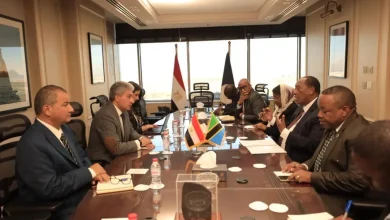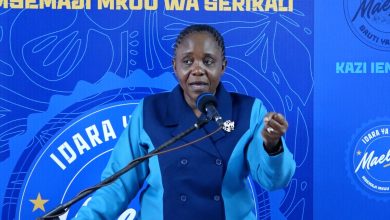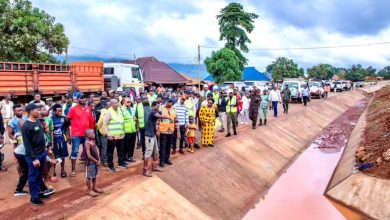WHAT’S INSIDE: KEY HIGHLIGHTS FROM UDP’S MANIFESTO

DAR ES SALAAM: THE United Democratic Party (UDP) has launched its 2025–2030 election manifesto which the party said it outlines a road map for building a selfreliant nation — one that depends primarily on domestic productivity rather than foreign aid and loans.
The party envisions an empowered population where citizens actively participate in driving national development through strategic sectors such as agriculture, tourism, fishing, industry and mining.
The manifesto identifies six core priorities—Agriculture, Health, Industry, Education, Water and ICT— structured to align with the government’s term of office to ensure realistic and measurable implementation.
AGRICULTURE UDP plans to:
• Strengthen food and cash crop production through modern farming technology, improved inputs and expanded irrigation systems.
• Establish agro-processing industries to add value to agricultural produce and create reliable markets for farmers.
• Encourage youth participation in modern agriculture as a viable source of employment.
• Facilitate access to credit, insurance and market information for smallholder farmers.
Rationale:
Agriculture employs about 65 per cent of Tanzanians and remains the backbone of the economy, particularly in rural and peri-urban areas.
It is a key supplier of raw materials to local industries and the main guarantor of food security.
The sector has the potential to broaden the tax base and increase revenue for better public service delivery.
Despite its importance, agriculture receives a small portion of the national budget—only about 1.8 to 2.7 per cent.
UDP proposes increasing this allocation to at least 10 per cent, in line with the Maputo Declaration, to make agriculture the primary engine in poverty reduction and sustainable growth.
HEALTH SECTOR UDP plans to:
• Conduct a comprehensive review of health research and statistics to guide evidence-based planning.
• Strengthen primary healthcare services, ensuring the availability of medicines, diagnostic equipment and skilled personnel.
• Improve the welfare and motivation of health workers.
• Introduce a universal health insurance system co-funded by the government and communities, linked with the National Identification (NIDA) system for efficient management.
• Promote health awareness campaigns focusing on prevention, nutrition and maternal health.
Rationale:
• No nation can be productive without a healthy population.
• Health is a basic human right and a key driver of national development.
• UDP recognises the achievements of past governments in expanding healthcare infrastructure but stresses the need to strengthen quality, equity and accessibility.
• The ultimate goal is to ensure that all Tanzanians enjoy quality healthcare without financial or geographical barriers.
INDUSTRIAL SECTOR UDP plans to:
• Formulate a strong industrial policy focusing on value addition to agricultural, mining and livestock products.
• Develop enabling infrastructure such as reliable electricity, modern roads, ports and logistics systems to support industrial investment.
• Offer consistent and predictable tax policies to attract both local and foreign investors.
• Create industrial parks and special economic zones to promote manufacturing and innovation.
• Strengthen linkages between agriculture and industry to ensure steady raw material supply.
Rationale:
• Industrialisation is a proven engine for job creation, import substitution and increased national income.
• By promoting domestic value addition, Tanzania can reduce its dependence on imported goods and become more competitive globally.
• UDP believes that industrial development will stimulate small and medium enterprises (SMEs), drive innovation and build a resilient economy anchored in local resources.
EDUCATION SECTOR UDP plans to:
• Conduct a full review of the education system from primary to higher learning to assess curricula relevance and learning outcomes.
• Invest in science, technology and vocational education to align training with job market demands.
• Upgrade teacher training and improve their working conditions to raise education quality.
• Promote innovation and research through collaboration between schools, universities and industries.
• Expand digital learning infrastructure to reach rural and underserved areas.
ALSO READ: UDP’s Saum Rashid officially starts the race for the Presidential post
Rationale:
• Education is the foundation of sustainable national development.
• A skilled, knowledgeable and innovative population is essential for industrialisation and technological progress.
• UDP believes education must serve as a tool for liberation, creativity and competitiveness in the global economy.
• The party notes that education reform requires long-term planning and substantial investment, hence its strategic placement within the five-year framework.
CLEAN AND SAFE WATER UDP plans to:
• Develop permanent water infrastructure, including dams, boreholes, purification plants, tanks and modern irrigation systems.
• Protect and sustainably manage natural water sources—rivers, lakes and aquifers—from depletion and pollution.
• Expand water services for domestic, agricultural, industrial and livestock use in both urban and rural areas.
• Promote gender and social equity in water access, recognising the heavy burden that shortages place on women and children.
• Introduce innovative technologies such as rainwater harvesting, solar pumping and digital water management systems.
Rationale:
• Access to clean water is essential for health, agriculture, industry and environmental conservation.
• Without reliable water supply, food security and industrial growth are compromised and social inequality deepens.
• UDP envisions a Tanzania where every household has access to safe and sufficient water—an essential step toward inclusive development.
INFORMATION AND COMMUNICATION TECHNOLOGY (ICT) UDP plans to:
• Expand broadband infrastructure—fibre, 4G/5G and satellite—to reach all corners of the country.
• Lower internet access costs to promote affordability for all citizens.
• Promote investment in data centres, cloud computing and ICT innovation hubs.
• Integrate ICT training into the national education system, from early childhood to higher learning, including skills in Artificial Intelligence (AI), blockchain and cybersecurity.
• Strengthen e-Government systems to enhance transparency, efficiency and accountability.
• Promote digital entrepreneurship, e-commerce and mobile-based financial services.
• Encourage the creation of Kiswahili digital content to preserve culture and improve accessibility.
Rationale:
• ICT is a cross-cutting enabler of progress in all sectors—linking people, systems and markets.
• A digitally connected Tanzania will promote efficiency in governance, boost economic inclusion and nurture innovation.
• Bridging the digital divide will empower youth and rural communities to participate in the global digital economy.
• The ultimate goal is to build an innovation-driven, transparent and competitive nation.
EXPECTED OUTCOMES OF THE 2025–2030 UDP MANIFESTO
If implemented, the UDP manifesto aims to achieve:
• A modernised and selfsustaining agricultural economy.
• Universal access to affordable healthcare services. • Rapid industrialisation anchored in local value addition.
• Quality education that empowers youth for innovation and employment.
• Universal access to clean and safe water for all citizens.
• A robust digital economy that connects people, businesses and government services. UDP says their 2025– 2030 manifesto provides a roadmap for transforming Tanzania into a self-reliant, inclusive and innovation-driven economy.
Through a focus on six interlinked sectors—agriculture, health, industry, education, water and ICT—the party seeks to empower Tanzanians to take control of their development journey and reduce dependency on external aid.
UDP’s message is clear: True independence means economic self-sufficiency, productive citizens and equal opportunity for all.





